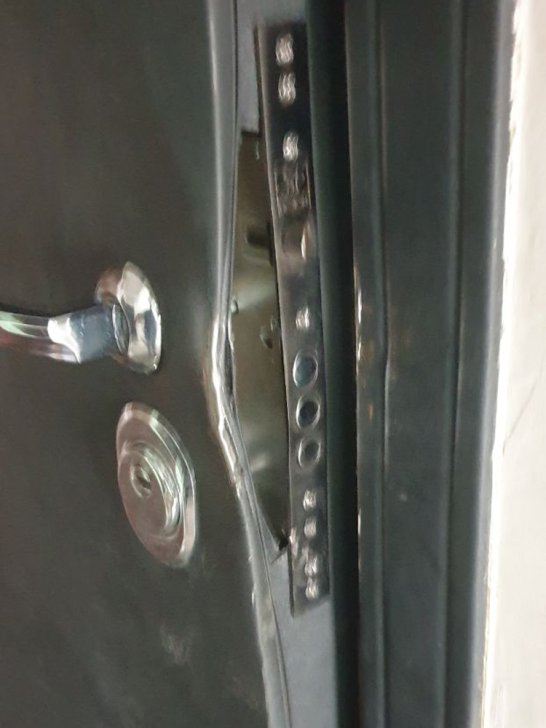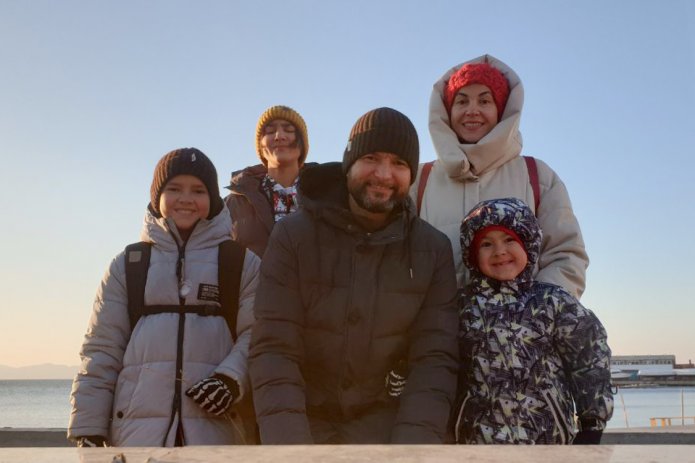Since the full-scale war in Ukraine began, an activist from the Far Eastern city of Vladivostok, Aleksey Galimov has been voicing his antiwar opinion on social media. Since February 2023, he has been holding solitary pickets. In March, authorities searched Galimov’s apartment, and in June, the police came to his mother’s place. Following these events, the activist, along with his wife and three children, left Russia. This is his story, as told by Alkesey.
Some years ago, my colleagues and I worked as contractors for a construction company called «Megaline». And in 2017, I watched Navalny’s investigation and discovered that this company belonged to Prigozhin. It was then that I realised I had unknowingly contributed to his illegal enrichment. That troubled me deeply. That same year, when Navalny visited Vladivostok, I attended his rally. I listened to him. After that, I have been participating in all protests.
I began holding solitary pickets in 2023. I have a friend from Ukraine; we used to work together. His brother, Zhenya, joined the Ukrainian Territorial Defense Forces and was surrounded in January. During that time, my friend reached out on our chat, asking us to pray for Zhenya. We kept praying, and miraculously, the Russian forces withdrew. That experience was the last drop for me and I decided that I could not remain silent any longer.
On February 1st, I went out with my first poster bearing a Biblical verse: «Thou shalt not kill.» I was all shaking, unsure about how it was going to turn out. I stood in front of an underground passage on a square. The first person who walked out from the passage glanced at me, smiled, raised his fist, and gestured «I’m with you, brother.» In that moment, it was an immense support.
People passing by are far from indifferent; they comprehend everything quite well. I have observed it countless times: some individuals filmed me, others waved, some raised their fists, some smiled, and some said encouraging words. I grasped that what I was doing had an impact, it was influencing others. When one person holds a solitary picket here, and then another one holds it there, someone posts something, while another tears off a [pro-war] leaflet — all of that reveals the sentiment of the people.
At the pickets, I used quotes from the Bible because I perceive this aggressive act [the war] as the work of evo; forces. There is a Biblical text: «Do not move an ancient landmark that your fathers have set.» There is Ukraine with its established borders. There is also Russia with its established borders. And then Putin decides to widen those borders.
On February 24th, I held a poster with the message: «Do not fight, for you shall not find success.» I wanted to convey: The war you are fighting has neither a foundation, nor an ideology. What is its purpose? Why? Russia will inevitably lose it.

I would often get arrested after pickets, taken to police stations. No reports were ever filed, but I received warnings. A police officer on duty told me: you can’t argue with the Bible — it is a perfect system.
After the second protest in February, a brigade of medics came to the police station and took me to a psychiatric hospital where I was released from after having a conversation. In March I went to the square where I usually hold pickets but for some other reason. This time I was arrested in the underpass. I knew the police officers, we had already met several times. They cited a suspicion that I was planning a robbery as the reason for my arrest.
They used to say that before. They took me to the police station. There were some officers on duty whom I also knew. I was joking: «Shall we have some tea and candies next time? Should I bring them?». Then I was also released without a police report. I asked why I was detained. They answered that it was preventative.
Then I went back to my car, sat down, and a Road Patrol Service vehicle immediately blocked the road. They demanded all sorts of documents, a fire extinguisher, a first aid kit and wrote me a bunch of tickets. The police officer laughed: «Who did you mess with? We got a call from above telling us to give you a full-blown dressing-down». I have never parked in the square again since then.
Day of the search
On 8 March, my family and I were in a restaurant in a good mood. But on 9 March at 6:20 am we heard a soft knock on the door. A few days earlier our downstairs neighbours were flooded and we thought that it was happening again. I approached the door and instead of looking through the peephole asked: «Who is there?» They answered: «This is the police» and started banging on the door. They said that if I didn’t open the door they would break it down.
In a few minutes they broke down the door and three officers from the Center for Combating Extremism [aka Center E], three officers of Special Rapid Response Unit [SOBR] and two witnesses came running in. My wife and three children also woke up all disturbed. My wife fell to her knees, put her hands up, and said: «Don’t shoot». They hesitated and let her go join the children.

I fell face down on the floor because I realised that if I didn’t lie down, I could be thrown down. A huge officer from SOBR climbed on top of me and pinned me down with his knee while the search warrant was being read to me. I remember there was an article about discrediting the Russian army, social network and names of some people. I later found out these names were from Yabloko (a Russian liberal pro-democracy opposition party).
Law enforcement officers ordered us to hand them over the phones, computers and flash drives. They checked everything and looked in our closets. I was still on the floor, the SOBR officer moved his knee to my neck, I started gasping for air. My wife stepped in: «Can’t you see he is in pain?». Then I was lifted up and allowed to get dressed. The officer from the Center E said that I was lucky not to have been beaten up because «usually the SOBR guys are angry early in the morning, they hit you a few of times for sure».
The raid continued for about three hours. Then I was put in a car with the SOBR officers. On the way they told me about their several military assignments to the war in Ukraine and asked me why I was against it. One of them was particularly aggressive. I thanked God that he was in the front seat and could not reach me. I was calm, I read the OVD-Info guidelines [we publish guides on what to do when engaging with authorities] before, and I explained my point of view to them: as a man of faith I can’t remain silent when people are murdered.
At the police station, I was immediately told: «Now we are going to call PMC ‘Wagner’. They will take you to a special room where you will sign the contract and go to the war». After that they paused. I understood that they could do this and force me to sign under torture. Police officers mentioned a second option — a pre-trial detention centre.
Then, the Center E officers started questioning me about how my antiwar pickets were connected to the Yabloko party. They were mentioning names I did not recognise. They deliberately ignored my requests to clarify the status of my detention, presumably to keep me anxious. They also asked if I intended to go out and picket again. I replied that I was scared and I wouldn’t, they laughed. Then they said: «We will release you for now. Stay quiet and wait for the investigator’s call. We will decide what to do with you.»
I was shocked that they let me out.
After the raidTwo days later, with the assistance of friends we rented an apartment and moved. Living with a broken door was frightening. We did not go out much and did not contact many people. When housing and communal services people came to our door and started knocking, we were very frightened. It reminded us of the morning when we were searched. I was afraid to even approach the door. We went to another room, locked ourselves in and sat there quietly.
On June 12th, I could not resist and published a post on ‘Odnoklassniki’ about my antiwar views. The next day, the police came to my mother and asked about me. That is when I realised that I had to leave. I purchased a ticket to Ulan-Ude from where I hitchhiked to Mongolia.
When I crossed the border, I felt like a huge weight had been lifted. I understood that I did not need to constantly look over my shoulder, wait for someone to knock on my door or come after me. I am still Russian and I love my homeland but I feel much freer now. I became even more relieved when we reunited with our family in Istanbul. From there, we went to Mexico and then applied for political asylum in the United States.

A few years ago, my wife discovered her Polish roots, and we considered repatriating, but we didn’t plan to flee. If the opportunity arises, I will, of course, return to Russia, but only when the regime changes.
My wife agrees with my antiwar position, but after the search at our home we had a serious conversation. I am the sole provider for our family. If I am imprisoned, she will be left destitute with the children. My wife warned that in such a case they would leave Russia. We have three sons, the eldest is 14, and it is uncertain how long the war will continue. That is when I realised that I could lose my family because of my principles. Honestly, I did not leave for my own sake but for my family’s well being.
We have conflicts in our church [Seventh-day Adventists in Vladivostok] too: some people suggest praying for the war and for the Russian army. Inside the church there are people who are ‘for’ and pray to God about it, and there are people who are ‘against’ and pray for the war’s end. This has divided us as believers and separated us from believers in Ukraine. I have raised this issue many times and asked the pastor why he remains silent. Eventually I found out that they were told that whoever speaks up will face the fate of Jehovah’s Witnesses [declared an extremist organisation, the Witnesses experience tremendous repression in Russia].



